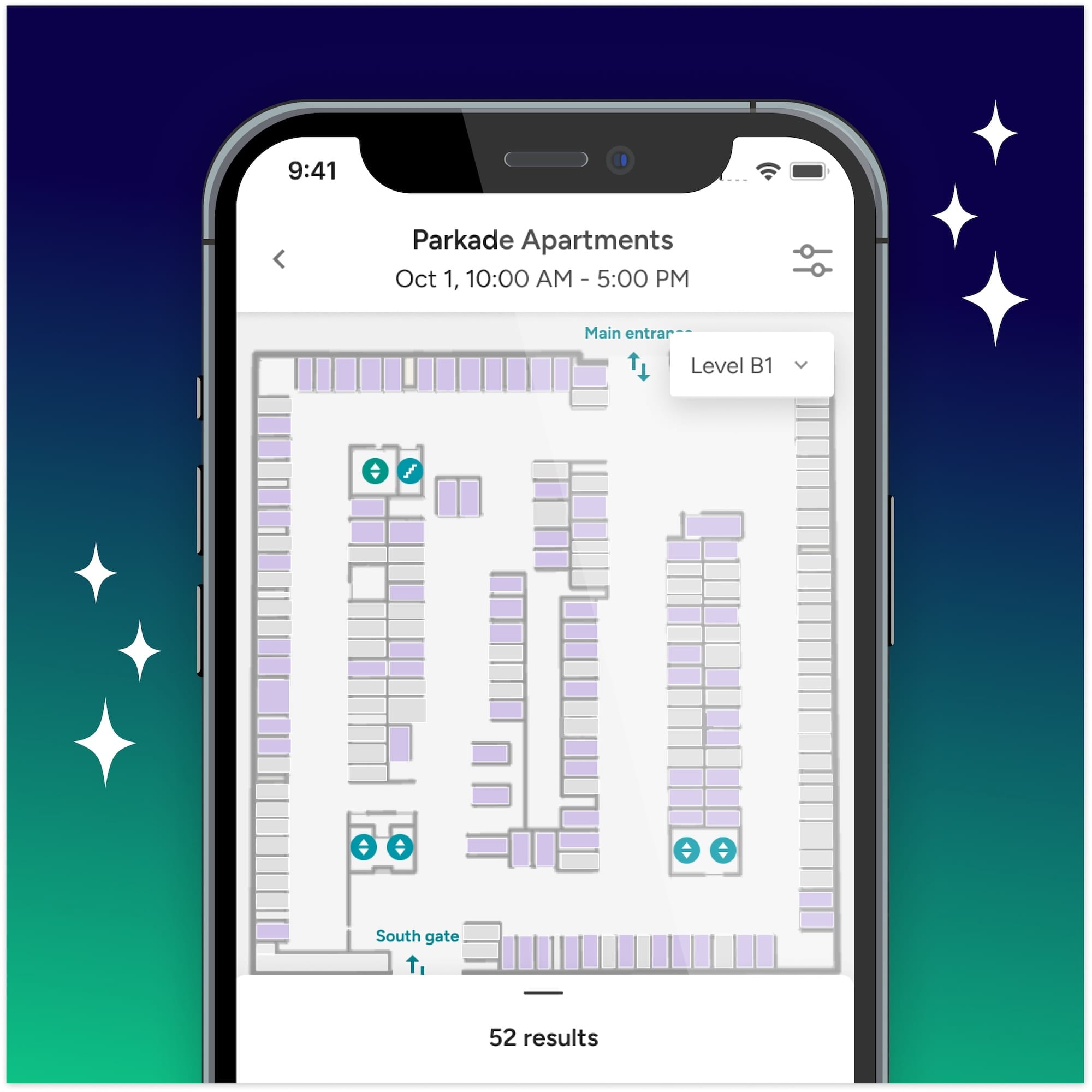

TABLE OF CONTENTS
When was the last time your property conducted a parking audit? For many property managers, these verification processes — designed to ensure everyone parking on your property is authorized to be there — are necessary but dreaded tasks that often get pushed to the bottom of the priority list.
The fundamental issue is how parking is typically managed. When residents have to go through property management to get a parking spot, crucial information invariably falls through the cracks — emails get missed, records don't get updated, and rentable items are forgotten. Traditional audits try to correct these problems but end up creating more headaches: Confusion and uncertainty, missed revenue, and hours of staff time with little to show for it.
The reality is that these audits are built on manual processes in an increasingly digital world, creating a perfect storm of inefficiency and frustration.
We don’t disagree with the importance of a parking audit. Maintaining your parking records is one of the most foundational necessities for a property. However, the traditional approach has several critical flaws that doom it from the start:
Our team has walked into property management offices and seen giant stacks of paper with hundreds of vehicle details and discovered it was the results of their parking audit. These hundreds of pieces of paper are physical evidence of just how cumbersome the process really is. We’ve come to find out this is the norm.
The traditional audit process typically involves staff members physically walking the lot or garage, clipboard in hand, recording vehicle information, and comparing it against existing records. It also often involves reaching out to residents to verify and update vehicle/spot information. For a property with hundreds of spaces, this can take days to complete.
When you're manually recording license plate numbers, make/model information, and spot assignments, mistakes are inevitable. Transposed numbers, misread letters, or simple oversight can render a significant portion of your audit data useless.
We’ve heard from several clients, coming to us fresh off the frustration of poorly done parking audits, that a major problem is that the goals for the audit aren’t clear from the beginning. When you don't begin with clear expectations about what you're looking for and what actions you'll take based on the findings, it's difficult to get an audit right the first time around.
With a process that is already highly time-consuming, you can’t afford to go in blind. If you do, it often results in multiple rounds of verification, extending the process even further.
Many audit processes involve contacting residents with outdated information to verify their vehicles. But when residents don't respond within the timeframe (which happens frequently), property managers face a difficult choice: extend the deadline (further delaying the process) or enforce the rules (potentially towing authorized vehicles with outdated records).
Setting deadlines for residents to update their information often doesn't solve the problem either. If you enforce the deadline by towing vehicles, you may end up with upset residents whose cars were towed despite having permission to park –– it just wasn’t updated in your records. All that gives you is an earful of angry residents.
These inherent flaws in traditional parking audits lead to several costly problems for properties, including:
Your on-site team already has enough on their plate. Spending days conducting audits takes them away from other critical responsibilities.
Despite all the time invested, manual audits often fail to achieve their primary goal: updated, accurate parking records. The process is so unwieldy that new discrepancies can develop before you've even finished addressing the ones you found.
Without reliable records, enforcement becomes a gamble. This leads to inappropriate towing (generating resident complaints) or non-enforcement (allowing unauthorized parking to continue). Many times, this leads properties to outsource enforcement to a third-party towing company to wipe their hands of the issue. But the result is often overly aggressive or even predatory towing practices. This has led to come states, like Colorado, banning the practice altogether.
Perhaps most importantly from a business perspective, inaccurate parking records often mean you're not capturing all potential parking revenue. Unauthorized vehicles take up spaces that could be generating income, while administrative errors can lead to missed billing opportunities. A client once told us that they had residents getting free parking for years without the team’s knowledge. That same client came to realize that they had about $10k/year’s worth of spots available that they didn’t know about because of inaccurate records.
Technology doesn't just improve parking audits—it replaces them entirely
Here's the good news: the entire concept of parking audits is becoming obsolete thanks to parking management technology.
Instead of conducting periodic audits to correct accumulating errors, modern parking systems maintain accurate records in real time through automated processes and direct resident input.
By switching to a digital system like Parkade, you eliminate the "telephone game" that occurs when residents have to go through property management to update parking information. Everything happens instantly, with no middleman.
With digital parking management, you no longer need to rely on physical hang tags or decals. Instead:
As a result, your parking records stay current with you having to wait for the next audit to discover (costly and annoying) problems.
When you need to check for unauthorized vehicles, technology transforms the process from a days-long audit to a quick task.
Parkade's new Mobile Patrol feature makes enforcement simpler and more powerful. While you’re walking the lot, you can pull up a list of unleased spots via the app, then check if they're empty. The newest features include license plate scanning — when pointed at a car, it instantly transcribes the plate, confirming whether that car is authorized. If the vehicle should be parked elsewhere, the app shows the correct location.
For assigned parking, you can quickly filter for unleased spots that should be vacant. Whoever's patrolling can swipe right to remove spots they've already checked from the list or swipe left to report a vehicle that shouldn’t be there.
The impact on your team's workload is immediate and significant. Properties using digital parking management systems report completely eliminating their parking audits (which weren't happening as often as they should anyway). While these audits could take weeks to complete effectively, teams are now able to spend as little as an hour or less per week on parking management in total.
This time savings allows your team to focus on what really matters: providing excellent service to your residents rather than chasing down parking violators.
Traditional parking audits are fundamentally flawed because they attempt to periodically correct a broken system rather than fixing the system itself. By implementing a digital parking management solution, you're not just making audits easier — you're eliminating the need for them entirely.
With real-time updates, simplified enforcement tools, and resident self-service capabilities, your parking data stays accurate day in and day out. No more clipboard audits, no more stacks of paper, and no more frustrated residents or staff.
Ready to leave parking audits in the past where they belong? Learn how Parkade can transform your property's parking management and automate your audits away.
.jpg)
As parking management becomes increasingly digital, security becomes critical — and we’re excited to share that we've achieved a major security milestone.
Read Story
We’re thrilled to announce one of our most significant leaps forward this year: the launch of dynamic maps across our mobile and web applications.
Read Story
Now that AB 1317 is official, it’s time to brush up on the requirements and see how your properties stand to benefit.
Read Story